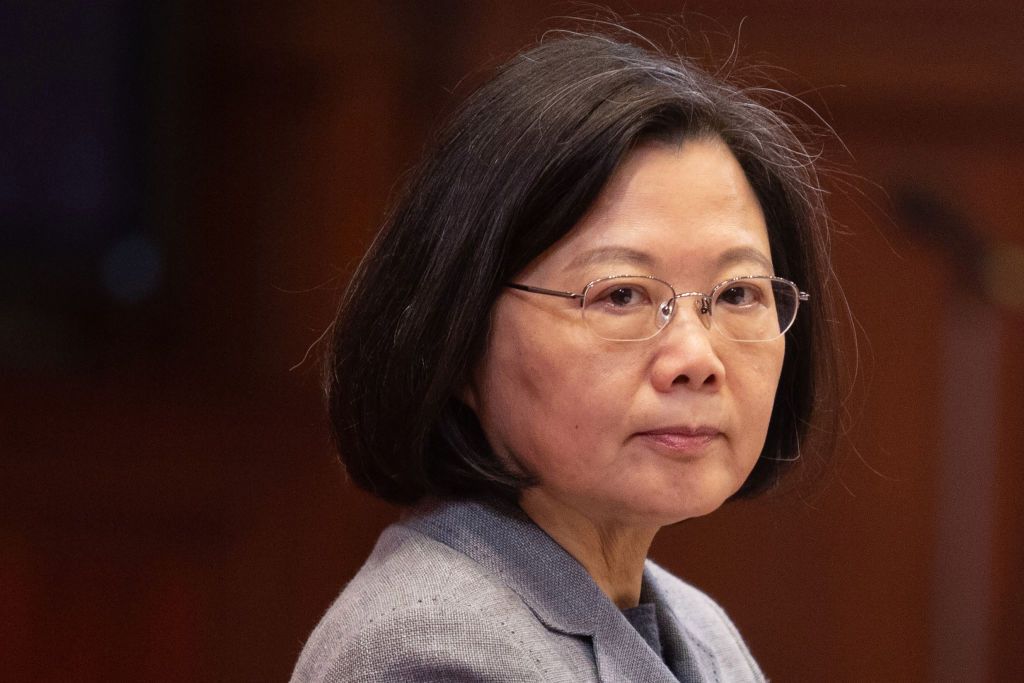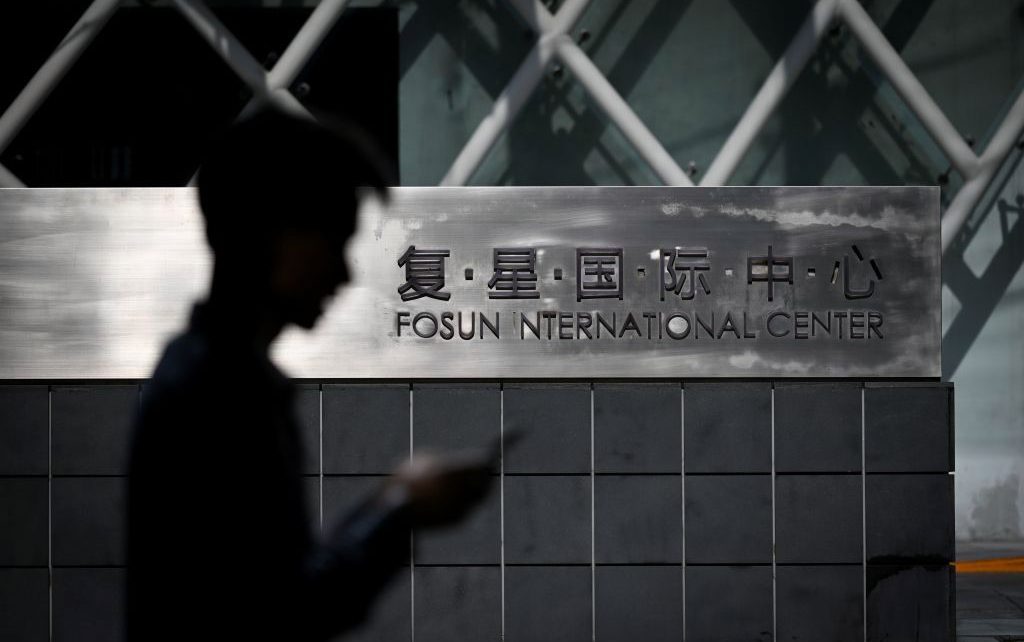On Nov. 30, Hong Kong’s government announced a rare piece of news that was welcome in all sectors of a politically-divided city battling its fourth wave of COVID-19 infections: The vaccines are on their way.
Hong Kong had purchased 7.5 million doses of a vaccine co-developed by U.S. pharmaceutical giant Pfizer and German vaccine maker BioNTech, Hong Kong’s chief executive Carrie Lam and other government ministers said at a press conference.
At the event, government ministers repeatedly referred to the first vaccine as either Pfizer’s or BioNTech’s.
“We have an in-principle agreement with Pfizer,” Lam said on Dec. 11 while explaining the logistics of distributing the vaccine.
But later that night, the government’s language changed. It issued a statement clarifying that it had ordered the doses through Chinese pharmaceutical giant Fosun Pharma, BioNTech’s COVID-19 partner in China. Fosun Pharma, the statement said, would control the “sales and marketing” of the vaccine in Hong Kong, meaning the doses will carry Fosun’s name. The statement also specified that the doses would be manufactured in Europe, not in China.
Subscribe to Eastworld for weekly insight on what’s dominating business in Asia, delivered free to your inbox.
The backlash was swift, as critics called out the government for what they saw as an attempt to gloss over the involvement of Fosun, a firm based in mainland China. Mary Ma, a local newspaper columnist in Hong Kong, argued that the government’s effort to brand the vaccine as Pfizer’s at the press conference, without mentioning that it would be sold by a Chinese company, was a public relations flub that could “backfire” by undermining public trust in the vaccine.
To be sure, the vials of the BioNTech vaccine headed for Hong Kong contain the same immunizing cocktail that hospitals in the U.S., Canada, and the U.K. have received. But Fosun marketing and distributing the doses is unique to mainland China, Hong Kong, Taiwan and Macau, and its role could complicate distribution of the vaccine since some people in the region are skeptical of any company associated with mainland China.
Developing the vaccine
In late 2020, the BioNTech vaccine became the gold standard of COVID-19 vaccines, posting a 95% efficacy rate in phase III clinical trials and earning emergency authorization from regulators in the U.S., Canada and U.K.
BioNTech and Pfizer are the corporate names tied to the vaccine’s rapid development, with their CEOs becoming the public faces of the extraordinary scientific feat. But Fosun Pharma has been a sort of silent third party in the venture all along.
Fosun Pharma is a subsidiary of Fosun Group, the private Chinese conglomerate with vast international holdings that include the Club Med Hotel chain, an English Premier League soccer team, and the circus group Cirque du Soleil. In its own right, Fosun Pharma is one of China’s largest health care companies, manufacturing and selling drugs as well as providing health care services in hospitals.
Fosun Pharma jointly founded the Sinopharm Group with the Chinese government in 2003. Sinopharm, for its part, is China’s leading seller of pharmaceuticals and controlled 15% of all drug distribution in China as of 2018. Sinopharm says Fosun owns a 49% stake in the company, with the other shares controlled by China’s government.

Early in the pandemic, on March 15, Fosun Pharma agreed to invest $135 million in BioNTech to conduct clinical trials and buy the rights to exclusively license BioNTech’s COVID-19 vaccine candidates in Greater China, an area the companies define as mainland China, Taiwan, Hong Kong and Macau. Fosun said it would help develop the vaccine, though BioNTech’s mRNA technology is at the heart of the effort.
Two days after Fosun and BioNTech signed their deal, American pharmaceutical giant Pfizer announced its own investment in BioNTech—worth as much as $748 million—for the right to license and distribute BioNTech’s vaccine in the rest of the world.
As BioNTech’s partners, Fosun and Pfizer both helped execute early tests of the vaccine. Pfizer launched phase I and II trials in the U.S. and Germany in May, and Fosun got one underway in mainland China in late July.
Critically, Pfizer and Fosun were testing different versions of BioNTech’s vaccine. As it turned out, Fosun had a losing candidate. BioNTech’s other candidate, which Pfizer helped test, performed better.
The outcome of the trials is one reason why Pfizer has overshadowed Fosun as BioNTech’s partner.
Another is China’s relative containment of COVID-19. Compared to places like the U.S. and Europe, where Pfizer conducted trials as the virus raged, China was unsuitable territory for Fosun and BioNTech to conduct large-scale phase III trials since volunteers need to be exposed to the virus to determine if the vaccine is effective. In the U.S., Pfizer’s phase III clinical trials came to a speedy conclusion due to widespread COVID-19 outbreaks.
Dr. Aimin Hui, Fosun Pharma’s chief medical officer, says his company was “deeply involved” in BioNTech’s vaccine research and development process. While one of Fosun’s human trials ultimately failed, Hui notes that Fosun conducted an earlier animal trial of the vaccine candidate that was successful.
BioNTech is quick to point out that its collaboration with Fosun relied on BioNTech’s own technology, and it plays up Fosuns role as a distribution partner in China.
“Fosun brings a lot of experience with the Chinese regulatory system and in bringing new products to market,” a BioNTech spokesperson told Fortune. “If we are successful in gaining approval for our vaccine in China, Fosun Pharma will be responsible for distributing it.”
Still, Fosun is a partner in BioNTech’s ongoing trials in mainland China. The two companies jointly launched a new phase I/II trial in the mainland in November, this time with BioNTech’s leading candidate.
Beijing has said it will not approve the BioNTech candidate until the trials conclude, but on Dec. 16 Fosun purchased 100 million doses of the vaccine for the Chinese market, indicating Fosun is optimistic about rolling out the vaccine in China in 2021. The Hong Kong-based newspaper the South China Morning Post recently reported that Fosun is preparing to distribute vaccine doses in China as early as this month.
For now, BioNTech is responsible for manufacturing doses for the Chinese market, but that could change.
BioNTech said in October that its vaccines for China’s market would be manufactured entirely in Germany, but BioNTech told Fortune that’s only the case for BioNTech’s first vaccine shipment to China. Starting with the second shipment, BioNTech will send vaccine materials to Fosun to “fill and finish,” meaning Fosun will fill the vials and package the vaccines for distribution. Both companies told Fortune that Fosun may eventually manufacture the vaccine start to finish in China.
On Dec. 30, Chinese news outlet Caixin reported that the two companies are in talks to build a manufacturing plant in China with the capacity to produce 200 million doses of the vaccine annually.
Fosun’s ties with Sinopharm will also prove crucial for distribution of the vaccine that must be kept at ultra-low temperatures, Fosun told Fortune.
In September, Fosun said in a press release that it would work with Sinopharm to set up its cold-chain distribution network in China.
For deployment to Hong Kong, Hui told Fortune the vaccine will be shipped in a dry-ice container to Hong Kong—he did not specify if it would come directly from Europe or mainland China—and stored in a Hong Kong cold warehouse at -70 degrees Celsius. The doses will then be brought to vaccination centers in refrigerated trucks for distribution in the city, he said.
Sinopharm’s experience in distributing drugs in China may prove a boon to Fosun’s efforts to roll out the vaccine on a massive scale, but the partnership also means Fosun is relying on a state-owned entity that has faced transparency questions about its own COVID-19 vaccine. Chinese authorities have approved a COVID-19 inoculation developed by a unit of Sinopharm that the company says in 79% effective. Authorities in the United Arab Emirates, Bahrain, and Egypt also have cleared the vaccine for use, but the company has not provided data to back up its claims about how well the jabs work.
Branding problem
Even though Fosun is just distributing BioNTech’s vaccine at this point, it’s facing some pushback in the region because it’s a mainland China-based company.
In Hong Kong, activists have urged the government not to buy any vaccines produced in mainland China. The activists have long decried mainland China’s influence over the city’s affairs and believe Hong Kong’s potential reliance on Chinese vaccines is the latest example of how the city is subject to Beijing. Hong Kong’s government, meanwhile, has said those who criticize the government for working with Chinese companies on the vaccine rollout are “rumormongers” that act with “evil intentions.”
Fosun faces some opposition in Hong Kong, but its problems in Taiwan may be even more substantial.
Taiwan’s government says it has a long-standing ban against importing mainland Chinese-made vaccines and other biological products. Officials have cited China’s recent history of vaccine scandals as a reason why it continues to enforce the prohibition. The BioNTech doses may skirt the ban since they’ll be sourced from Europe initially, but the vaccine could still meet resistance from the Taiwanese public if it passes through Fosun’s hands.
“The vast majority of Taiwanese [citizens] no longer trust China,” says Chunheui Chi, director for the Center of Global Health at Oregon State University. The skepticism is deep-rooted—the two sides are engaged in a decades-long fight over Taiwan’s sovereignty—and has flared of late, due to Beijing blocking Taiwan from participating in the World Health Organization and its failure to disclose the contagiousness of COVID-19 in the early stages of the pandemic.

That mistrust could be why Taiwan has yet to officially strike a deal for the vaccine.
In November, Chen Shih-chung, the head of Taiwan’s Central Epidemic Command Center, was asked at a press conference whether Taiwan would import BioNTech’s vaccine if it was distributed by China’s Fosun Pharma.
“There is no way Taiwan would import vaccines made in China,” Chen said. But Chen seemed to leave open the possibility that Taiwan could import the ‘Fosun’ vaccine if it was manufactured outside of mainland China. “The place of manufacture is important,” he said.
Fosun did not answer Fortune’s questions on how it plans to deal with potential pushback in Hong Kong and Taiwan.
The BioNTech vaccine is already difficult to distribute—it must be kept at sub-arctic temperatures and administered in two doses several weeks apart. But in places like Hong Kong and Taiwan, the backlash against the vaccine’s distributor may be an additional challenge to overcome.
More health care and Big Pharma coverage from Fortune:
- Vaccinating the world against COVID is off to a slow start. These firms think A.I. and blockchain could help
- Timeline: From the first coronavirus cases to the first vaccinations
- It’s the New Year, and pharma companies are already hiking prices for popular drugs
- Commentary: In the COVID vaccine rollout, our expectations don’t match reality
- The COVID recession may kill more Americans than COVID-19 does




